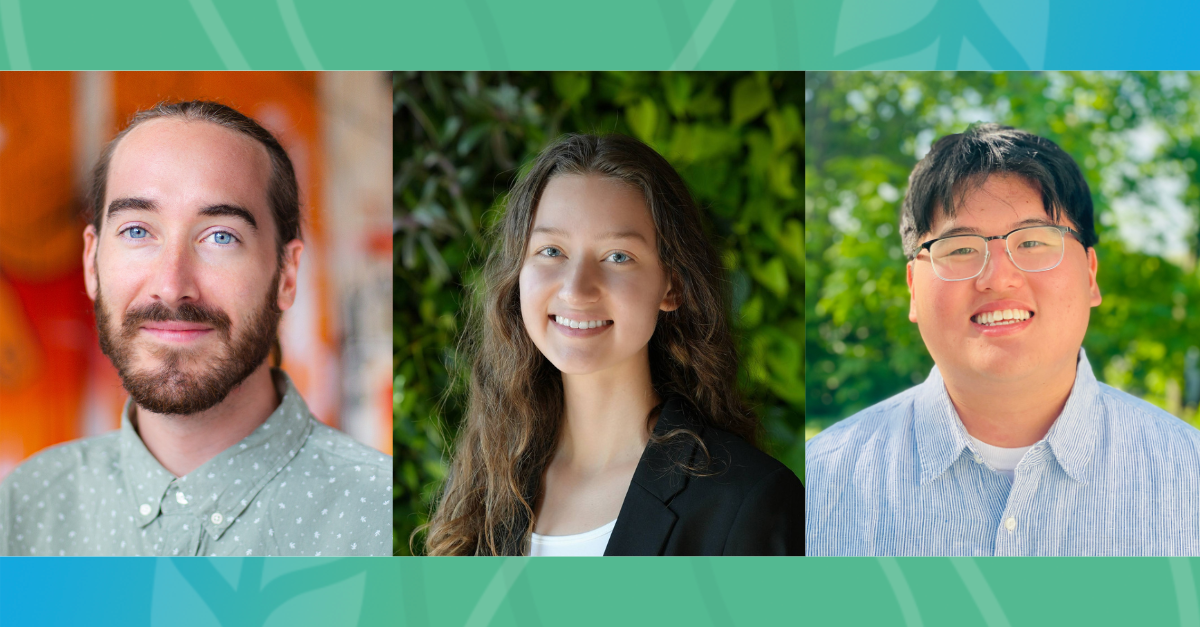News J-WAFS announces 2025 Travel Grantees to attend World Water Week
Three outstanding MIT graduate students will receive funding to attend the water conference in Sweden this summer
Emily Stangel June 2, 2025
J-WAFS provides travel grants to MIT graduate students to support their attendance at select international water conferences, aiming to deepen their understanding of global water systems. The grants provide learning and networking opportunities for MIT students pursuing careers in the water sector, whether in academia, nonprofit organizations, government, or industry. Today, J-WAFS is pleased to announce that three outstanding students have been selected to receive funding to attend the Stockholm World Water Week conference this August. Congratulations to Grace Smith (Department of Mechanical Engineering), Patrick Song (Department of Biological Engineering), and Tyler Barron (Department of Urban Studies and Planning)!
Stockholm World Water Week is a major annual conference that attracts people from across sectors who are working on global water issues. The conference is organized by the Stockholm International Water Institute (SIWI). This year’s conference theme is “Water for Climate Action,” focusing on addressing the linked emergencies of climate change, environmental degradation, and biodiversity loss.
The J-WAFS Travel Grant for Water Conferences is supported by gifts to J-WAFS from Xylem Inc. and GoAigua, both J-WAFS Research Affiliates and water technology companies. Xylem is also a global sponsor of World Water Week, as well as the Stockholm Junior Water Prize, which is awarded during the event. In addition to a wide variety of programmed events at World Water Week, the three MIT students will have the opportunity to meet with Xylem leaders and attend Xylem-sponsored side events, including a tour of their research facility in Stockholm.

Pictured from left to right: Tyler Barron, Grace Smith, and Patrick Song, the three travel grant awardees.
Learn more about the 2025 grantees below:
Tyler Barron is a master’s student working under Larry Susskind in the Department of Urban Studies and Planning. Tyler recently served as a board member of an agricultural non-profit organization dedicated to improving the local food system within his hometown of Falmouth, MA. This experience provides the opportunity to explore the various components that make up Falmouth’s aquatic food production and supply chains.
Tyler received a bachelor’s degree from UMass Amherst in sustainable food and farming. As an undergraduate student, he explored the role of water at John Todd Ecological Design, an ecological engineering firm focused on wastewater treatment and remediation. Additionally, he's worked as a farmer, landscaper, carpenter, deckhand, and field assistant.
By participating in Stockholm’s World Water Week, Tyler hopes to hone an approach to planning that is grounded in water-based and water-informed solutions. He is fascinated by this year's theme, “Water For Climate Action,” as it centers the role of water within the conversation of climate change, and focuses on environmental degradation and biodiversity loss.
Grace Smith is a master's student in the Department of Mechanical Engineering at MIT, working in Svetlana Boriskina's Multifunctional Metamaterials (META) Lab. Grace’s research involves addressing the challenge of water scarcity in arid regions by developing high-efficiency atmospheric water harvesting (AWH) techniques. Her work focuses on sorption-based technology, which uses hydrogels, salts, and metal-organic frameworks (MOFs) to capture atmospheric moisture, followed by water extraction via evaporation-condensation. She is interested in using vibrational mechanical actuation as a novel water release method to improve the efficiency of AWH systems.
Before MIT, Grace received a B.S. in mechanical engineering from the University of Illinois Urbana-Champaign in 2024. She spent two years in a research-intensive program creating low-tech, low-cost water filters for countries in the developing world. This experience was fundamental in establishing her interest in sustainability through conducting research to combat water scarcity. The project also broadened her awareness of global water scarcity and motivated her to pursue this work in graduate school at MIT.
Grace’s work is centered on developing new water harvesting strategies that are affordable, energy-efficient, and adaptive to extreme climate conditions. Through both academic and international collaborations, Grace is advancing technologies that can support climate resilience and health in water-stressed regions. These efforts reflect a core principle of Stockholm World Water Week: solving water issues requires interdisciplinary science and global cooperation.
Patrick Song is a PhD student in biological engineering at MIT and a National Science Foundation (NSF) Graduate Research Fellow. His research is at the intersection of biomaterials, synthetic biology, and environmental sustainability. Under Professor Angela Belcher, he is developing an engineered living material (ELM) utilizing genetically engineered yeast for low-cost bioremediation and biomining. In developing countries, state-of-the-art chemical or electro-based water treatment methods are inaccessible due to their high energy, technological, and financial costs. Patrick’s system enables efficient toxic metal removal from water while minimizing environmental impact and costs.
Inspired by his parents’ upbringing in Korea, where they experienced environmental inequities and pollution, Patrick is dedicated to developing practical, scalable solutions. His passion for environmentally-focused research continued to grow as an undergraduate student at Tufts University, where he used biocompatible silk fibroin to create sustainable biomedical devices. Drawn to eco-friendly biomaterial applications, he later continued his work at Mori, a start-up developing silk-based coatings to reduce food waste. Through that work, he was exposed to urgent issues such as climate change, plastic pollution, and food insecurity. His experiences in both academia and industry drive his mission to create deployable technologies for underserved communities worldwide.
Attending Stockholm World Water Week provides a rare opportunity for Patrick to further deepen his understanding of these challenges, exchange insights on his biomaterial filter, and learn from experts beyond the scope of his lab at MIT. Ultimately, Patrick is attending this year’s conference to align his research with global needs, and contribute to raising broad awareness around biomaterials and water remediation.